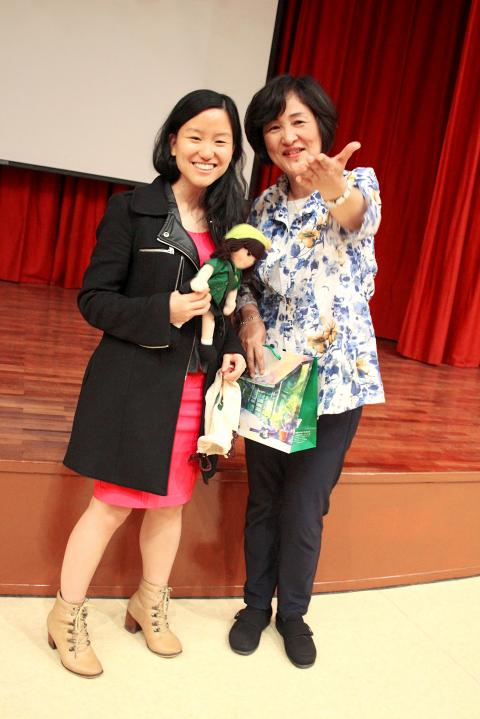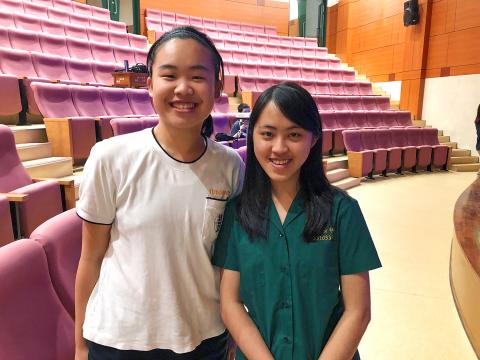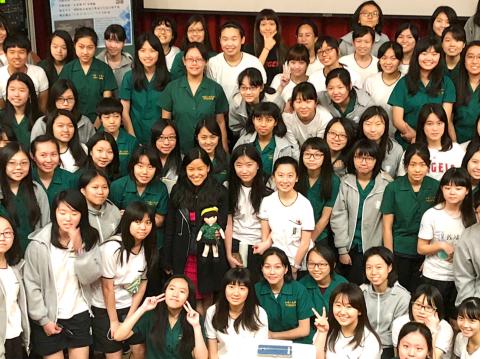Tsai Hsin-hsuan (蔡昕璇) wants to be an engineer, but her mother has other ideas.
“She thinks if I study medicine, I can marry a doctor and start a family,” says the Taipei Municipal First Girls’ Senior High School student. “But raising kids is too hard for a woman in engineering.”
Ten years ago, Marita Cheng’s mother also pushed her toward medicine. The robot inventor, tech entrepreneur and founder of Robogals, an organization that runs robotics workshops for high school girls in 10 countries, gave Tsai and her classmates new hope when she shared her success story at their school on International Youth Day last Wednesday. Cheng also addressed the challenges of being a woman in the engineering field and called for more female role models.

Photo courtesy of Taipei First Girls’ Senior High School
“Women hold up half the sky,” Cheng tells the girls. “Engineering is the driving force behind every great change in our world today; we need to get involved and be decision makers.”
‘A MAN’S WORLD’
Cheng says that girls studying engineering can get through high school and university with few hurdles, but the workplace is where reality hits.

Photo: Liam Gibson
“There can be a lot of ageism and sexism, especially in more established companies run by older men,” she says.
Women who’ve excelled academically often drop out of the industry because they aren’t respected or listened to in such companies and prefer to make a bigger impact in other fields.
“This is why so many parents tell their daughters, ‘Don’t do engineering — it’s a man’s world,’” Cheng says.

Photo: Liam Gibson
In addition, the biological clock and related social pressures mount for young women in their twenties, forcing them to weigh up career with family commitments.
“Girls want to know they are doing the right thing by everyone,” Cheng says. “There is importance placed on pleasing.”
Despite these challenges, Cheng is optimistic about the future of women in the industry.
Law and medicine were once male-dominated fields that have now reached relative parity, and Cheng says engineering is next. There are more opportunities in the field for female nowadays as they stand out from the crowd and are more likely to be considered for schools or companies looking to address their gender imbalance, she says.
WO-MENTORS NEEDED
Cheng idolized the founders of Google and Apple as a teenager, but she notes that there is a dearth of female role models in the field.
Yet, Cheng has found her greatest role model in her mom, who worked hard cleaning kitchens as a single mother to get Cheng through school.
“I inherited her ‘get on with it’ attitude,” she says. “Mom made me realize that whatever I wanted in life, I had to make it happen myself.”
Halle Shen (沈和儀) says that young women need more role models like Chen, who blazed her own path.
“I have a lot more opportunities now than she did at my age,” Shen says. “If she can achieve her dreams, then so can I.”
At least two students asked Cheng if she’d be starting a Robogals chapter in Taiwan. Cheng said that any group of three university students can start a chapter and coordinate with a university to do high school visits.
To learn more, visit www.robogals.org

The canonical shot of an East Asian city is a night skyline studded with towering apartment and office buildings, bright with neon and plastic signage, a landscape of energy and modernity. Another classic image is the same city seen from above, in which identical apartment towers march across the city, spilling out over nearby geography, like stylized soldiers colonizing new territory in a board game. Densely populated dynamic conurbations of money, technological innovation and convenience, it is hard to see the cities of East Asia as what they truly are: necropolises. Why is this? The East Asian development model, with

June 16 to June 22 The following flyer appeared on the streets of Hsinchu on June 12, 1895: “Taipei has already fallen to the Japanese barbarians, who have brought great misery to our land and people. We heard that the Japanese occupiers will tax our gardens, our houses, our bodies, and even our chickens, dogs, cows and pigs. They wear their hair wild, carve their teeth, tattoo their foreheads, wear strange clothes and speak a strange language. How can we be ruled by such people?” Posted by civilian militia leader Wu Tang-hsing (吳湯興), it was a call to arms to retake

This is a deeply unsettling period in Taiwan. Uncertainties are everywhere while everyone waits for a small army of other shoes to drop on nearly every front. During challenging times, interesting political changes can happen, yet all three major political parties are beset with scandals, strife and self-inflicted wounds. As the ruling party, the Democratic Progressive Party (DPP) is held accountable for not only the challenges to the party, but also the nation. Taiwan is geopolitically and economically under threat. Domestically, the administration is under siege by the opposition-controlled legislature and growing discontent with what opponents characterize as arrogant, autocratic

Desperate dads meet in car parks to exchange packets; exhausted parents slip it into their kids’ drinks; families wait months for prescriptions buy it “off label.” But is it worth the risk? “The first time I gave him a gummy, I thought, ‘Oh my God, have I killed him?’ He just passed out in front of the TV. That never happens.” Jen remembers giving her son, David, six, melatonin to help him sleep. She got them from a friend, a pediatrician who gave them to her own child. “It was sort of hilarious. She had half a tub of gummies,